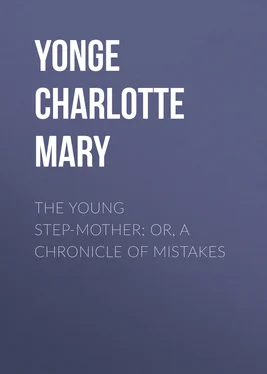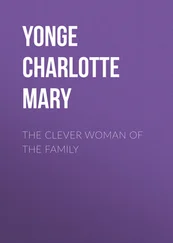Charlotte Yonge - The Young Step-Mother; Or, A Chronicle of Mistakes
Здесь есть возможность читать онлайн «Charlotte Yonge - The Young Step-Mother; Or, A Chronicle of Mistakes» — ознакомительный отрывок электронной книги совершенно бесплатно, а после прочтения отрывка купить полную версию. В некоторых случаях можно слушать аудио, скачать через торрент в формате fb2 и присутствует краткое содержание. Жанр: foreign_prose, literature_19, Европейская старинная литература, foreign_antique, на английском языке. Описание произведения, (предисловие) а так же отзывы посетителей доступны на портале библиотеки ЛибКат.
- Название:The Young Step-Mother; Or, A Chronicle of Mistakes
- Автор:
- Жанр:
- Год:неизвестен
- ISBN:нет данных
- Рейтинг книги:4 / 5. Голосов: 1
-
Избранное:Добавить в избранное
- Отзывы:
-
Ваша оценка:
- 80
- 1
- 2
- 3
- 4
- 5
The Young Step-Mother; Or, A Chronicle of Mistakes: краткое содержание, описание и аннотация
Предлагаем к чтению аннотацию, описание, краткое содержание или предисловие (зависит от того, что написал сам автор книги «The Young Step-Mother; Or, A Chronicle of Mistakes»). Если вы не нашли необходимую информацию о книге — напишите в комментариях, мы постараемся отыскать её.
The Young Step-Mother; Or, A Chronicle of Mistakes — читать онлайн ознакомительный отрывок
Ниже представлен текст книги, разбитый по страницам. Система сохранения места последней прочитанной страницы, позволяет с удобством читать онлайн бесплатно книгу «The Young Step-Mother; Or, A Chronicle of Mistakes», без необходимости каждый раз заново искать на чём Вы остановились. Поставьте закладку, и сможете в любой момент перейти на страницу, на которой закончили чтение.
Интервал:
Закладка:
‘I have been living among them nearly all my days,’ said Albinia. ‘I hope you will give me something to do, I should be quite forlorn without it;’ and she looked up to his kind, open face, as much at home with him as if she had known, him for years.
‘Fanny—my wife—shall find work for you,’ he said. ‘You must excuse her calling on you, she is never off the sofa, but—’ And what a bright look he gave! as much as to say that his wife on the sofa was better than any one else off . ‘I was hoping to call some of these afternoons,’ he continued, ‘but I have had little time, and Fanny thought your door was besieged enough already.’
‘Thank you,’ said Albinia; ‘I own I thought it was your kindness in leaving me a little breathing time. And would Mrs. Dusautoy be able to see me if I were to call?’
‘She would be delighted. Suppose you were to come in at once.’
‘I wish I could, but I must go on to Mrs. Meadows’. If I were to come to-morrow?’
‘Any time—any time,’ he said. ‘She is always at home, and she has been much better since we came here. We were too much in the town at Lauriston.’
Mr. Dusautoy, having a year ago come out of the diocese where had been Albinia’s home, they had many common friends, and plunged into ‘ecclesiastical intelligence,’ with a mutual understanding of the topics most often under discussion, that made Albinia quite in her element. ‘A great Newfoundland dog of a man in size, and countenance, and kindness,’ thought she. ‘If his wife be worthy of him, I shall reck little of all the rest.’
Her tread the gayer for this resumption of old habits, she proceeded to Mrs. Meadows’, where the sensation created by her poor little basket justified Lucy’s remonstrance. There were regrets, and assurances that the girl could have come in a moment, and that she need not have troubled herself, and her laughing declarations that it was no trouble were disregarded, except that the old lady said, in gentle excuse to her daughter, that Mrs. Kendal had always lived in the country, where people could do as they pleased.
‘I mean to do as I please here,’ said Albinia, laughing; but the speech was received with silent discomfiture that made her heartily regret it. She disdained to explain it away; she was beginning to hold Mrs. and Miss Meadows too cheap to think it worth while.
‘Well,’ said Mrs. Meadows, as if yielding up the subject, ‘things may be different from what they were in my time.’
‘Oh! mamma—Mrs. Kendal—I am sure—’ Albinia let Maria flounder, but she only found her way out of the speech with ‘Well! and is not it the most extraordinary!—Mr. Dusautoy—so rude—’
‘I should not wonder if you found me almost as extraordinary as Mr. Dusautoy,’ said Albinia.
Why would Miss Meadows always nettle her into saying exactly the wrong thing, so as to alarm and distress the old lady? That want of comprehension of playfulness was a strangely hard trial. She turned to Mrs. Meadows and tried to reassure her by saying, ‘You know I have been always in the clerical line myself, so I naturally take the part of the parson.’
‘Yes, my dear,’ said Mrs. Meadows. ‘I dare say Mr. Dusautoy is a very good man, but I wish he would allow his poor delicate wife more butcher’s meat, and I don’t think it looks well to see the vicarage without a man-servant.’
Albinia finally made her escape, and while wondering whether she should ever visit that house without tingling with irritation with herself and with the inmates, Lucy exclaimed, ‘There, you see I was right. Grandmamma and Aunt Maria were surprised when I told them that you said you were an able-bodied woman.’
What would not Albinia have given for Winifred to laugh with her? What to do now she did not know, so she thought it best not to hear, and to ask the way to a carpenter’s shop to order some book-shelves.
She was more uncomfortable after she came home, for by the sounds when Mr. Kendal next emerged from his study, she found that he had locked himself in, to guard against further intrusion. And when she offered to return to him the key of the cellaret, he quietly replied that he should prefer her retaining it,—not a formidable answer in itself, but one which, coupled with the locking of the door, proved to her that she might do anything rather than invade his privacy.
Now Maurice’s study was the thoroughfare of the household, the place for all parish preparations unpresentable in the drawing-room, and Albinia was taken by surprise. She grew hot and cold. Had she done anything wrong? Could he care for her if he could lock her out?
‘I will not be morbid, I will not be absurd,’ said she to herself, though the tears stood in her eyes. ‘Some men do not like to be rushed in upon! It may be only habit. It may have been needful here. It is base to take petty offences, and set up doubts.’
And Mr. Kendal’s tender manner when they were again together, his gentle way of addressing her, and a sort of shy caress, proved that he was far from all thought of displeasure; nay, he might be repenting of his momentary annoyance, though he said nothing.
Albinia went to inquire after the sick man at her first leisure moment, and while talking kindly to the wife, and hearing her troubles, was surprised at the forlorn rickety state of the building, the broken pavement, damp walls, and door that would not shut, because the frame had sunk out of the perpendicular.
‘Can’t you ask your landlord to do something to the house?’
‘It is of no use, ma’am, Mr. Pettilove never will do nothing. Perhaps if you would be kind enough to say a word to him, ma’am—’
‘Mr. Pettilove, the lawyer? I’ll try if Mr. Kendal can say anything to him. It really is a shame to leave a house in this condition.’
Thanks were so profuse, that she feared that she was supposed to possess some power of amelioration. The poor woman even insisted on conducting her up a break-neck staircase to see the broken ceiling, whence water often streamed in plentifully from the roof.
Her mind full of designs against the cruel landlord, she speeded up the hill, exhilarated by each step she took into the fresh air, to the garden-gate, which she was just unhasping when the hearty voice of the Vicar was heard behind her. ‘Mrs. Kendal! I told Fanny you would come.’
Instead of taking her to the front door he conducted her across a sloping lawn towards a French window open to the bright afternoon sunshine.
‘Here she is, here is Mrs. Kendal!’ he said, sending his voice before him, as they came in sight of the pretty little drawing-room, where through the gay chintz curtains, she saw the clear fire shining upon half-a-dozen school girls, ranged opposite to a couch. ‘Ah!’ as he perceived them, ‘shall I take her for a turn in the garden while you finish your lesson?’
‘One moment, if you please. I did not know it was so late,’ and a face as bright as all the rest was turned towards the window.
‘Ah! give her her scholars, and she never knows how time passes,’ said Mr. Dusautoy. ‘But step this way, and I’ll show you the best view in Bayford.’ He took her up a step or two, to a little turfed mound, where there was a rustic seat commanding the whole exquisite view of river, vale, and woodland, with the church tower rising in the foreground. The wind blew pleasantly, chasing the shadows of the clouds across the open space. Albinia was delighted to feel it fan her brow, and her eager exclamations contented Mr. Dusautoy. ‘Yes,’ he said, ‘it was all Fanny’s notion. She planned it all last summer when I took her round the garden. It is wonderful what an eye she has! I only hope when the dry weather comes, that I shall be able to get her up there to enjoy it.’
Читать дальшеИнтервал:
Закладка:
Похожие книги на «The Young Step-Mother; Or, A Chronicle of Mistakes»
Представляем Вашему вниманию похожие книги на «The Young Step-Mother; Or, A Chronicle of Mistakes» списком для выбора. Мы отобрали схожую по названию и смыслу литературу в надежде предоставить читателям больше вариантов отыскать новые, интересные, ещё непрочитанные произведения.
Обсуждение, отзывы о книге «The Young Step-Mother; Or, A Chronicle of Mistakes» и просто собственные мнения читателей. Оставьте ваши комментарии, напишите, что Вы думаете о произведении, его смысле или главных героях. Укажите что конкретно понравилось, а что нет, и почему Вы так считаете.












